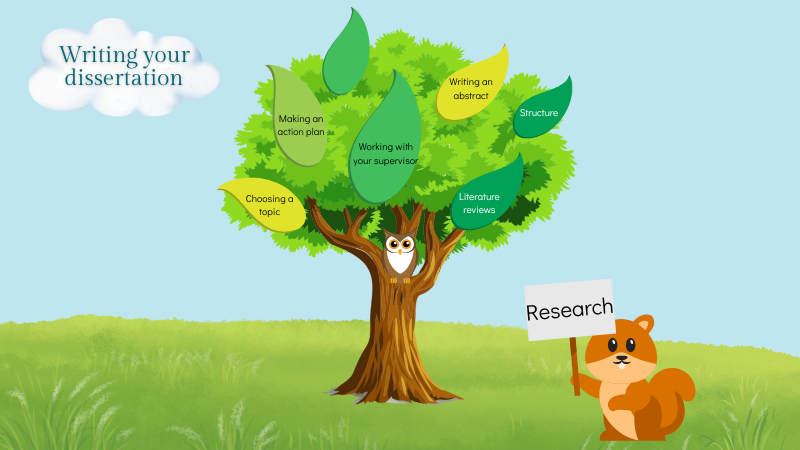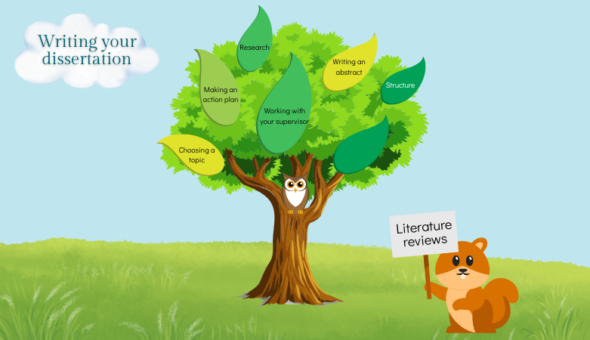Developing a research question
When you have selected your research topic, the next stage of the process is to sharpen, refine and define your topic, and identify a specific problem that is worthy of investigation. Here you need to set out:
- The issue that you will investigate and why it is important to do so
- The argument or thesis (what you want to prove, disprove, or explore)
- The limits of your research (i.e. what you will not be investigating)
What's the problem?
It's vital that you establish your research problem as soon as possible. Your research problem is the anchor that keeps your research from drifting off course, and ensures your dissertation is moving in a logical and coherent direction. When conducting your research reading and note-taking, you can then ask yourself, "Does this help me address the problem? If so, how and why?"
As you investigate the problem in more depth, you should always be open-minded and ready to revise, amend or change direction. You might find that evidence is unavailable to support critical analysis, or new evidence points to another more serious or topical problem. You might discover that you start to question your own assumptions, your views, or your stance regarding the problem. If you're thinking about changing your focus or problem, you should always talk to your supervisor. They will advise on the best course of action.
In the example below, the student has refined and improved their initial research topic to create a highly effective research problem.
| Research problem | Commentary |
| Public transport in Scotland | This sets out a research field but does not frame a research problem because it is too general. You don’t have time to study everything about a topic, so you should focus on an aspect you’re interested in |
| Examination of the influence of public transport links on new housing development in Western Scotland | This is a much better research problem as it establishes an argument (existence of public transport may have an influence on new housing development). However, it is still quite general and could be improved by further focus |
| Investigation of the relationship between public transport links and the development of new areas of housing in Western Scotland: a comparison of local plans and building development since 1990 | This is better still. It shows the limit of the project. You will be investigating a complex subject (public transport in Scotland) but will be focusing on one aspect of it (its possible influence on new housing development). You will make this large subject manageable by focusing on a limited period of time (1990 onwards) and limited sources |
As you may have guessed, the research problem can then be used as the title of your dissertation.
Creating a working title
A working title is your initial draft title that will allow you to get started on the research process. It may change as you work through your reading and carry out your investigation, but it is a necessary and useful starting point that allows you to narrow down the area of focus.
One method of devising your working title is to devise your research questions first and then transform those into a possible title.
In this example, the student has produced the following research questions, based on her area of interest which is the changing role of women in sport:
How easy is it for women to participate in cricket in the UK?
Has this changed over the past 20 years?
The student then transformed her research questions into the working title below:
An investigation into the current state of women’s cricket in the UK and how participation rates have changed over the past 20 years.
This simple approach will help you devise a meaningful 'working title' to kick start your dissertation and maintain focus when you begin your research.
Adapted from: Hopkins, D. and Reid, T., 2018. The Academic Skills Handbook: Your Guide to Success in Writing, Thinking and Communicating at University. Sage.
Your research proposal
A research proposal is a detailed description of the project you're going to undertake. Your department may require you to submit a research proposal as part of the dissertation assessment criteria, but even if you're not required to write one, we strongly recommend you do.
A research proposal will help you:
- Focus and distil your ideas and research so far
- Address suggestions and recommendations from your supervisor
- Think in detail about what you're going to do
- Identify and define your research problem
- Produce possible research questions
- Start planning the structure of your dissertation
Here are some headings to help you put together your research proposal:
| Topic: | This project will study… |
| Question/problem: | To find out… |
| Significance: | So that more will be known about… |
| Primary resources: | The main data will be… |
| Secondary sources: | Additional data comes from… |
| Methods: | The research will be conducted as follows… |
| Justification: | The method is most appropriate because… |
| Limitations: | There are some matters that this methodology may not help me to explain. These might include… |
It might be difficult to complete some of these headings at the start of your dissertation project, but this is okay. These gaps will help you identify where you need to focus your research and move the project forward. For example, if you're unsure where to find relevant sources to build your literature review, you can go back to your supervisor with specific questions, or seek advice from your subject librarian.
The research proposal is therefore an invaluable tool that will help you find your focus and get started on your dissertation.
Related blog posts
We have a number of blog posts about writing your dissertation. Make sure you check these out so that you're ready to get started:
- Making the most of expert and peer support
- Making an action plan
- Choosing a topic
- Working with your supervisor
- Literature reviews
- Structuring your dissertation (including contents, sections, and designing an effective structure)
- Writing an abstract - a six point checklist
Further support
If you'd like some further support on writing your dissertation, we offer 1:1 tutorials both online and in-person. Tutorials are available throughout the summer, and slots become available 14 days in advance. You can see what's available, and book a tutorial, in MySkills.
Respond



